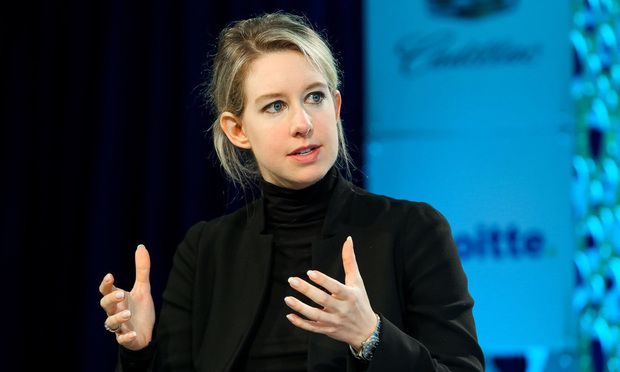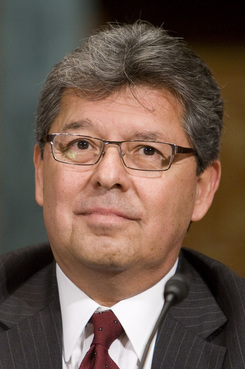Judge in Elizabeth Holmes Fraud Case Pushes Forward With Summer Trial Date Despite COVID-19
Lance Wade of Williams & Connolly, one of the Theranos founder's lawyers, said Wednesday that social distancing restrictions had made it "close to impossible" for the defense to prepare for the trial set to begin in August.
April 01, 2020 at 04:50 PM
4 minute read
The original version of this story was published on The Recorder
 Elizabeth Holmes
Elizabeth Holmes
The federal judge overseeing the criminal fraud case against Elizabeth Holmes on Wednesday held off suspending an August trial date for the founder of blood-testing company Theranos.
U.S. District Judge Edward Davila also took issue with the tone of a proposed order from Holmes' lawyers at Williams & Connolly, who asked that their work on the case be deemed "essential" so they could continue with her trial preparation.
Williams & Connolly's Lance Wade said during a telephonic hearing Wednesday that the proposed order was designed to allow Holmes' lawyers to do things such as arrange for service of trial subpoenas and travel, and that it wasn't meant to force the judge's hand into issuing an order allowing lawyers to violate state and local rules meant to curb the spread of the coronavirus.
"I assure you as someone who has a brother who is a first responder, I in no way seek to downplay this crisis," Wade said. "I in no way want to put the court in a difficult position."
 U.S. District Judge Edward J. Davila/photo by Diego Radzinschi
U.S. District Judge Edward J. Davila/photo by Diego RadzinschiDavila on March 20 severed Holmes' trial from her co-defendant, former Theranos president and COO Ramesh "Sunny" Balwani, but indicated that he planned to move forward with the Holmes trial as scheduled. Davila's order, which said there was "good cause" to sever the trials but did not elaborate further, was handed down after the Northern District of California closed its courtrooms to civil hearings and suspended the start of new trials until at least May in moves meant to address the coronavirus pandemic.
Davila at Wednesday's hearing said the "tone" of the proposed order asked him to acknowledge the seriousness of the current pandemic while also giving lawyers the authority to violate the local rules designed to abate it.
Wade and his colleagues initially asked for a September trial date, but had indicated that they would be able to prepare for a late July jury selection and early August trial if the government held to all applicable discovery deadlines. Wade said that because of government delays in document production and the complications of litigating during the ongoing pandemic, the defense team had "walked into Mt. Everest" and that it had become "close to impossible" to adequately prepare as scheduled.
Davila said that many of the complications that Holmes' lawyers are facing also face federal prosecutors, and that many of the tasks that need to be done can be accomplished remotely by reviewing documents digitally, and conducting meetings and witness interviews by videoconference. "Of course there's recognition of this pandemic and what it does and that's not lost on me," said Davila, adding that he had kept the trial date in hopes of keeping both the government and the defense lawyers making progress on preparing the case for trial.
Davila, however, said he worried that even in July potential jurors might be reluctant to sit in close quarters for the weeks that the trial is set to last. "What is our jury pool going to look like and be like in July?" Davila asked. "What's the national condition going to be given this current scourge that we are facing?"
The judge ultimately asked Holmes' lawyers and prosecutors to meet and confer about the feasibility of proceeding with the current trial date and report back to him in two weeks.
"The landscape changes daily and the most important thing is everyone's health," the judge said.
Read more:
Elizabeth Holmes' Lawyer Assails Theranos Prosecution as 'Massive Case With Undefined Contours'
Theranos Prosecutors: 'Common Sense' Only Thing Needed to Understand Charges Against Holmes
FDA's Top Lawyer Says Theranos Case Places 'Unprecedented' Discovery Strain on Agency
Lawyers for Elizabeth Holmes Make Dismissal Bid in Theranos Criminal Case
This content has been archived. It is available through our partners, LexisNexis® and Bloomberg Law.
To view this content, please continue to their sites.
Not a Lexis Subscriber?
Subscribe Now
Not a Bloomberg Law Subscriber?
Subscribe Now
NOT FOR REPRINT
© 2025 ALM Global, LLC, All Rights Reserved. Request academic re-use from www.copyright.com. All other uses, submit a request to [email protected]. For more information visit Asset & Logo Licensing.
You Might Like
View All
With DEI Rollbacks, Employment Lawyers See Potential For Targeting Corporate Commitment to Equality
7 minute read
MoFo Associate Sees a Familiar Face During Her First Appellate Argument: Justice Breyer

Amid the Tragedy of the L.A. Fires, a Lesson on the Value of Good Neighbors
Law Firms Mentioned
Trending Stories
- 1The Rise and Risks of Merchant Cash Advance Debt Relief Companies
- 2Ill. Class Action Claims Cannabis Companies Sell Products with Excessive THC Content
- 3Suboxone MDL Mostly Survives Initial Preemption Challenge
- 4Paul Hastings Hires Music Industry Practice Chair From Willkie in Los Angeles
- 5Global Software Firm Trying to Jump-Start Growth Hands CLO Post to 3-Time Legal Chief
Who Got The Work
J. Brugh Lower of Gibbons has entered an appearance for industrial equipment supplier Devco Corporation in a pending trademark infringement lawsuit. The suit, accusing the defendant of selling knock-off Graco products, was filed Dec. 18 in New Jersey District Court by Rivkin Radler on behalf of Graco Inc. and Graco Minnesota. The case, assigned to U.S. District Judge Zahid N. Quraishi, is 3:24-cv-11294, Graco Inc. et al v. Devco Corporation.
Who Got The Work
Rebecca Maller-Stein and Kent A. Yalowitz of Arnold & Porter Kaye Scholer have entered their appearances for Hanaco Venture Capital and its executives, Lior Prosor and David Frankel, in a pending securities lawsuit. The action, filed on Dec. 24 in New York Southern District Court by Zell, Aron & Co. on behalf of Goldeneye Advisors, accuses the defendants of negligently and fraudulently managing the plaintiff's $1 million investment. The case, assigned to U.S. District Judge Vernon S. Broderick, is 1:24-cv-09918, Goldeneye Advisors, LLC v. Hanaco Venture Capital, Ltd. et al.
Who Got The Work
Attorneys from A&O Shearman has stepped in as defense counsel for Toronto-Dominion Bank and other defendants in a pending securities class action. The suit, filed Dec. 11 in New York Southern District Court by Bleichmar Fonti & Auld, accuses the defendants of concealing the bank's 'pervasive' deficiencies in regards to its compliance with the Bank Secrecy Act and the quality of its anti-money laundering controls. The case, assigned to U.S. District Judge Arun Subramanian, is 1:24-cv-09445, Gonzalez v. The Toronto-Dominion Bank et al.
Who Got The Work
Crown Castle International, a Pennsylvania company providing shared communications infrastructure, has turned to Luke D. Wolf of Gordon Rees Scully Mansukhani to fend off a pending breach-of-contract lawsuit. The court action, filed Nov. 25 in Michigan Eastern District Court by Hooper Hathaway PC on behalf of The Town Residences LLC, accuses Crown Castle of failing to transfer approximately $30,000 in utility payments from T-Mobile in breach of a roof-top lease and assignment agreement. The case, assigned to U.S. District Judge Susan K. Declercq, is 2:24-cv-13131, The Town Residences LLC v. T-Mobile US, Inc. et al.
Who Got The Work
Wilfred P. Coronato and Daniel M. Schwartz of McCarter & English have stepped in as defense counsel to Electrolux Home Products Inc. in a pending product liability lawsuit. The court action, filed Nov. 26 in New York Eastern District Court by Poulos Lopiccolo PC and Nagel Rice LLP on behalf of David Stern, alleges that the defendant's refrigerators’ drawers and shelving repeatedly break and fall apart within months after purchase. The case, assigned to U.S. District Judge Joan M. Azrack, is 2:24-cv-08204, Stern v. Electrolux Home Products, Inc.
Featured Firms
Law Offices of Gary Martin Hays & Associates, P.C.
(470) 294-1674
Law Offices of Mark E. Salomone
(857) 444-6468
Smith & Hassler
(713) 739-1250







